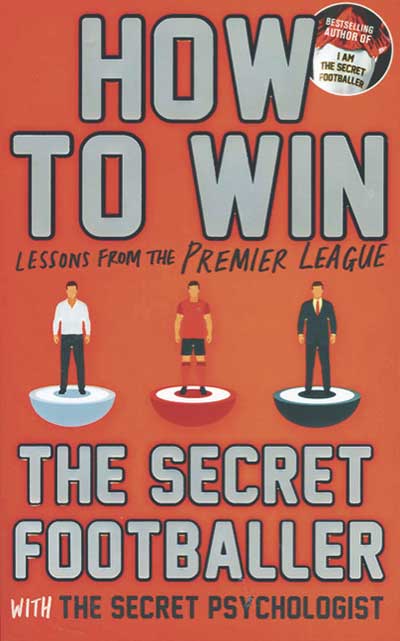
Guardian Faber, £12.99
Reviewed by Richard Pendleton
From WSC 363, May 2017
Buy the book
You can almost picture the scene, as the publishers stand around the dead horse of the Secret Footballer franchise, wondering how they can flog it for a final time. Silence reigns, broken only by suggestions that the Secret Footballer enters the antiques trade, buys a catering van or goes retro and runs a pub. Then someone suggests that the Secret Footballer teams up with someone who they brand as the Secret Psychologist, they give it a punchy title like “How To Win” and everyone goes home happy.
And yet, as various people flail away at the equine corpse with sticks, and more cynical readers note somewhat cattily that they’ve felt compelled to put a fake sticker on the cover saying that yes, this was written by the Secret Footballer despite the fact that his name appears in two inch high letters on the cover, it works. This should really not be the case, as the foreword, from the Secret Footballer and his wife, works bizarrely hard to persuade you that said Secret Footballer is like the person at school who wanted to be edgy and cool, but was actually called Mark and now collects horse brasses.
Once you’ve got past the endless repetition of the fact that he’s an edgy outsider from a ghostwriter who has to pretend to be both him and his wife in the space of a few short pages, it starts unpacking the game with a rare candour. The relationship between a player and his agent is an early instance of this and goes some way to restoring the idea that each agent’s reason for existence is to run away from the club with money stuffed down his trousers, by showing how carefully players need to be nurtured and have their egos massaged if they are not going to think themselves into oblivion.
Of more interest is the deeper psychology behind the game, although the Secret Footballer pops up to say things such as “Reverse psychology is a great thing when it’s used to wind somebody up for nothing more than banter”, which make it hard not to disregard the rest of the book. Advice on how to deal with nerves is applicable to Premier League footballers and Sunday League hopefuls, but it also helps anyone who is facing a change or a situation that makes them feel a sense of creeping dread. It is the same on learning how to manage people and their role in helping to understand their motivations.
The book drops the occasional, inevitable clanger, such as celebrating Claudio Ranieri’s success at Leicester weeks after his sacking and the spectacular renaissance of the team against Liverpool. However, the effect that the involvement of the Secret Psychologist has is that even the chapters where he only appears at the end are well researched and will make you see the game, and its feuding and vulnerable personalities, in a wholly different way. Their actions and psychology are explained and analysed by both protagonists, and case studies are discussed and analysed in an accessible way.
Get past some of the bellicose rhetoric and this is an unusual, entertaining read. It is also a pragmatic one. Buried in its heart is the sentence “the FA says we will win the World Cup in 2022. 2022? We’ll be lucky to make par”, which is a bleak but realistic assessment of just how resistant the English game is to change and to many of the methods it outlines. In that vein, it also ends on a prosaic note. “I had no plan for what to do once I arrived in the Premier League,” he says, “and that was my biggest problem.” It’s hard not to like any book capable of such honesty.